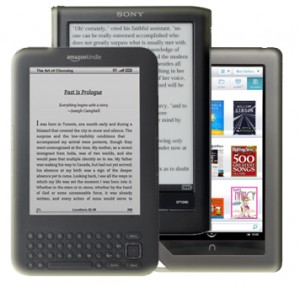 While nothing will ever replace the printed page, avid readers know that e-books are a fun and convenient alternative. Digital books can also be much cheaper than printed books, cutting the costs of a serious reading habit. To cut the costs even more, you need to learn how to save money by using e-book libraries.
While nothing will ever replace the printed page, avid readers know that e-books are a fun and convenient alternative. Digital books can also be much cheaper than printed books, cutting the costs of a serious reading habit. To cut the costs even more, you need to learn how to save money by using e-book libraries.
E-book libraries work in much the same way as a traditional library, only there aren’t any physical books to re-shelve at the end of the day. There are e-book libraries that are 100 percent free and others that cost on a book by book basis. Some are linked to physical libraries, while others only work with certain e-book reader formats. Here’s the scoop on the top players and how to read the books you find online.
Finding the Good E-book Libraries
The first step in finding good e-book libraries is to link up with your local library’s online arm. Even small libraries are using online lending platforms these days, the most common of which is OverDrive. OverDrive lets you download books through your library to your reader, computer, or mobile device, and deactivates files when the lending period is over.
Building on the local library link, there are a multitude of great online e-book libraries you can turn to for books. A quick online search will reveal dozens, but the current leaders are OpenLibrary (1,000,000+ free e-books), Project Gutenberg (40,000 free books), and ManyBooks.net (29,000 free e-books). For audio books, check out LibriVox, which is a volunteer-based system full of public domain books in multiple languages.
Reading Different Book Formats
Once you start downloading books from the different e-libraries, you’ll quickly notice they come in different formats. Some are made for Kindle, some for Nook, and some for the iPad, and it can be a pain without the right programs to get the file to open.
Fortunately, there are multiple free programs that will let you read books in pretty much every format on either your computer or your smart phone. Collect them all if you like – they don’t cost a penny and it will ensure there is no book that won’t open to you.
- Calibre is an open-source program for reading books in Nook, Kindle, PDF, and text files. It works on Windows, Apple systems, Linux systems, and mobile devices.
- The MobiPocket is an e-reader application designed primarily for mobile devices, although it also works on computers and laptops. It handles all the major formats and allows you to annotate the text as you go.
- Adobe Digital Editions supports PDFs, Sony Reader files, and EPUB/XHTML (some Kindle files). It’s linked with a free library of books and magazines, and available in ten languages other than English.
- Blio is a program that lets you see books in rich text with color images, available for Apple products, PCs, Androids, and Windows 7 phones.
- Kindle for PC can be downloaded on any computer and lets you read Kindle and Kindle-formatted books without having to own a Kindle.
Linking Up With Other E-book Deals
Along with the free e-libraries, there are many other free e-book deals out there if you keep your eye peeled – even for new releases. Amazon offers an ongoing list of the 100 most popular free e-books, and both Sony and Barnes & Noble have similar lists for the Nook and Sony Reader products. Remember, many authors offer their e-books for free when they’re first released as a way to boost their sales statistics and their total number of reviews.
In the independent realm, you’ll want to link up with PixelofInk.com, which posts daily blurbs on free and discount e-book listings, and Smashwords, which offers multiple self-published books for free daily. To borrow outside of any traditional library, hit up the swap services of digital books at eBookFling and Booklending.com.
There’s always a way to read for free – if you explore the technology and open up to non-traditional methods of getting your books. E-books are here to stay, and by scouting out all of the free sources for them, we can do more reading for less!
©2012 Off the Grid News
 Off The Grid News Better Ideas For Off The Grid Living
Off The Grid News Better Ideas For Off The Grid Living



